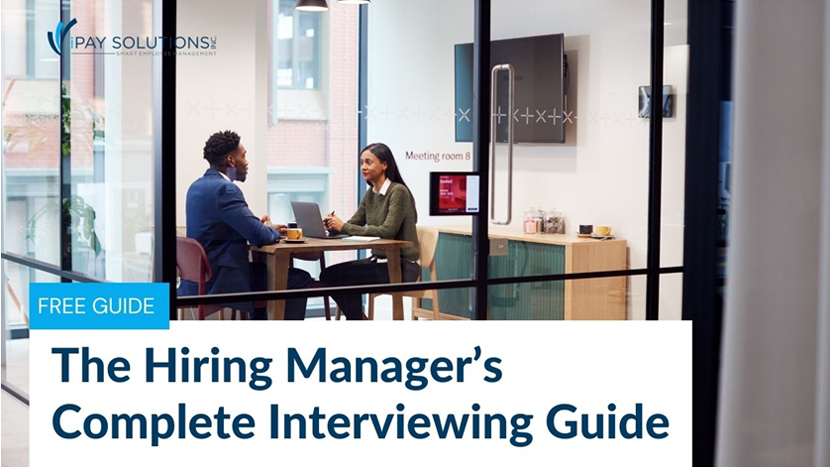The Hiring Manager’s Complete Interviewing Guide
During the interview process, there’s a lot of emphasis on your applicant giving all the right answers. Just as important, if not more so, are the questions you ask them. The quality of your questions drives the quality of the information delivered in the interview which, of course, sets the foundation for your hiring decisions.
But what differentiates an effective interview question from a ‘bad’ one? How can you ensure you have the best information to properly assess an applicant’s skill level and ability to fit into company culture? Well, it’s part art and part science.
We created this quick interview guide to help you supercharge your questions so you can find the best candidate, not just a suitable candidate. Ultimately, you and your colleagues are the only ones who know what you need in a candidate to achieve your goals, but we can give you tips and guidance to make the most of every question.
Why it’s important to ask the right questions.
The interview is the foundation of the hiring process. It’s not just the answers but the questions themselves that determine the success or failure of that process. Resumes can only tell you so much and they’re likely to tell the same story across many candidates. A good interview gives a glimpse into the candidate’s personality, critical thinking skills, real-world application of knowledge, and what sets them apart from the competition.
Asking vague and wide-open questions and sticking to old standbys leads to vague or overly rehearsed answers, ultimately providing a very one-dimensional view of your candidate. This can lead to a number of issues that impact your bottom line:
- A high turnover rate, which means an increase in hiring costs. Replacing an employee can cost employers 33% of an employee’s annual salary!
- An organization filled with ‘good enough’ employees rather than the best of the bunch due to a focus on weeding out ineffective candidates rather than talent acquisition.
- Skilled employees who don’t quite fit in with the company culture or work well with others.
Not only do ineffective questions slow down the hiring process, they slow down the overall growth of your company.
What kind of interview questions should I ask?
Consider this – if you’re tired of asking a question, you can be sure your candidate is tired of answering it.
So, what’s the right combination of questions to find your next superstar employee? Should you think outside of the box? Perhaps you should follow the good old HR handbook? We prefer a healthy mix of both!
More than anything, we believe ‘good’ questions are those that guide the applicant to reveal their character, values, and real world skills and behavior. To do that effectively, you’ll need to leverage insightful questions, tapping into topics such as:
- Behaviors
- Skills-Based
- Interpersonal
- Creative Thinking
- Managing Change
- Communication
- Problem-Solving
- Managerial
- Executive
- Industry
Should we pre-screen our interview candidates?
Absolutely! It gives you a chance to qualify the candidates before the official interview process begins, so they (and you) don’t waste time entertaining a bad fit. This pre-screening interview can be done over the phone or even through a ZOOM call.
Now is the time for the more surface level questions about aspirations, skills, and preferences. It’s also a great time to give an overview of the job description so the candidate is fully aware of what the position demands.
This is where you’ll get to ask questions about current and past work experience, career challenges and goals, and what they’re looking for in a company.
Some great examples are:
- What are the top 3 duties in the job you have now, or in your most recent job that correlates well to the position we have posted?
- Describe for me your ideal company.
- What specifically made you interested in this position?
What are some examples of good interview questions?
When selecting the perfect questions for your interview process, it’s important to keep in mind that there are many factors to take into account. Primarily, each industry will require some specific questions as well as the position itself.
As we mentioned before, the interview should guide the applicants to reveal not just their skill set but also how they will interact with other current employees.
Some of our favorite insightful hiring questions are:
- Tell me about a time that someone pointed out that you had made an error. How did you react and what steps did you take to correct it? (Behavioral)
- What would you have liked to do more of in your last position? What held you back? (Skills)
- What do you do when others resist or reject your ideas or actions? (Interpersonal)
- Tell me about a time when you tried to solve a problem with a totally different approach than is normally used. What was the result? (Creative Thinking)
- How do you handle stress? (Managing Change)
- Give an example of how you consider your audience prior to communicating with them. What factors influence your communication? (Communication Skills)
- Give an example of how you consider your audience prior to communicating with them. What factors influence your communication? (Problem Solving)
- How do you react when you find yourself hung up in an inefficient process? (Project Work)
This isn’t an exhaustive list, but it’s a great starting point to refine your interview process. If you’re ready to dig in deep and discover even more questions to help you find the perfect candidate, download our free Interview Questions Guide PDF.


